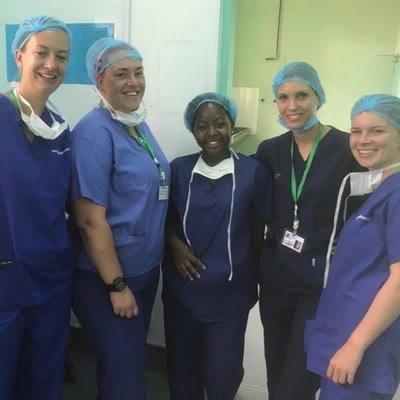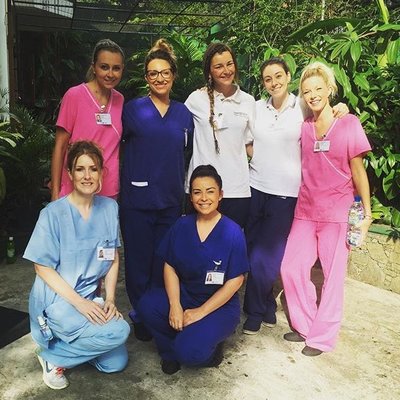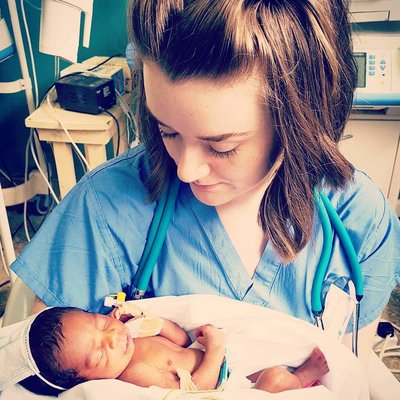Sydney Fischer, a Canadian RN, tell us about her journey from University, to her time nursing overseas, right through to her job as an RN in a rural hospital Alberta.
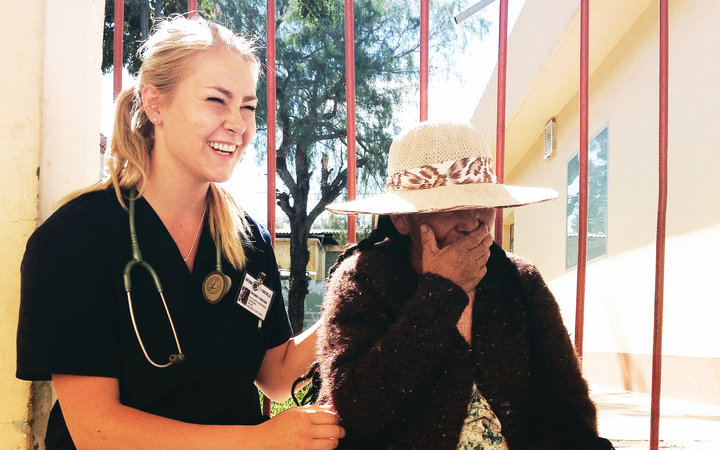
— Making connections with real people —
Joe: The best place to start with this is at the beginning. What was it that really secured your desire to become a nurse?
Sydney: Helping people has always been important to me. I was brought up that way — you're supposed to help others.
Another factor was that my sister got very sick at a young age and spent a lot of time in The Stollery — our children’s hospital in Edmonton, Alberta. And the experiences our family went through there helped inspire me to become a nurse for sure. When my sister was in the hospital, she had some very kind nurses who did so many little things to make her day better just that teenie bit better. And there were others who you could tell she wasn’t quite as happy with. It happens everywhere, kids latch on to specific nurses, but that for sure made me want to be one of the good ones.
Do you have any specific memories of the nurses who helped your sister?
My family was in pre-op with my sister right before her big surgery (she had a left hemispherectomy) and one of the nurses from her floor came downstairs knowing that it was ‘The Day’. And the nurses had written lots of nice things about her for her to read, and that made her feel better going into the surgery. It meant a lot to my sister and our family, them all going out of their way like that. Especially the one who came down.
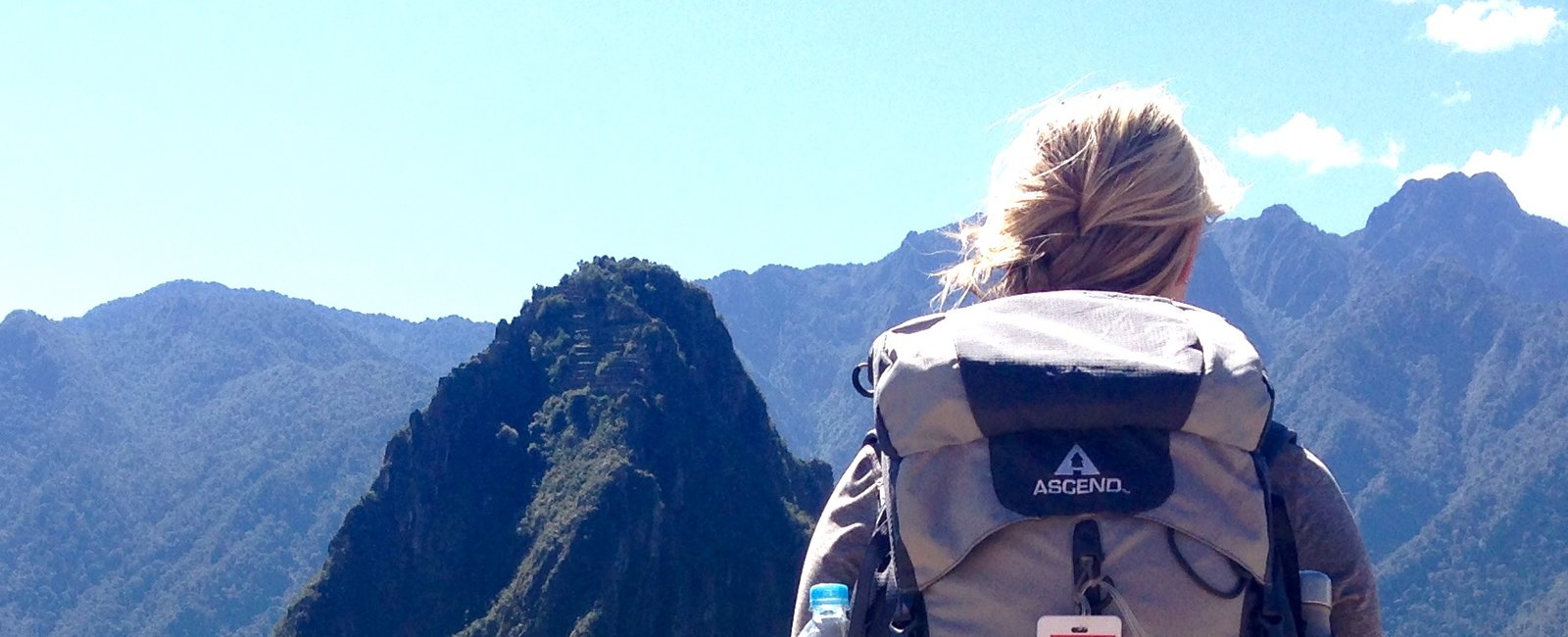
— Sydney had experiences that helped define her —
And then when she came out of surgery, the nurses in the ICU were just amazing. They were very calm and went through everything step by step again with her. She had to relearn absolutely everything — talking, walking, even swallowing. It was incredible to watch how the nurses were with her. They were incredible with our family as well, incorporating us in her care and explaining to us what was going on. It was terrifying, watching a little girl who was so full of life having to start essentially from scratch. Super inspiring at the same time.
I also think having three aunts who are nurses played a role in me wanting to become one as well.
Oh wow, you have three aunts who are in nursing as well. So, what was it about them being in nursing that inspired you towards it?
I think it was a lot to do with how much they talked about loving their jobs. I grew up in a small community, so I also heard a lot about the things they helped their patients through. Families never forget how you make their loved ones feel, and hearing how my aunts made a difference in their patient’s lives was humbling.
I think being a nurse played a big role in who my aunts have become as people. Always running around and never thinking twice about stopping if someone needs help. The kindness they have helped put into perspective the type of person I wanted to become.
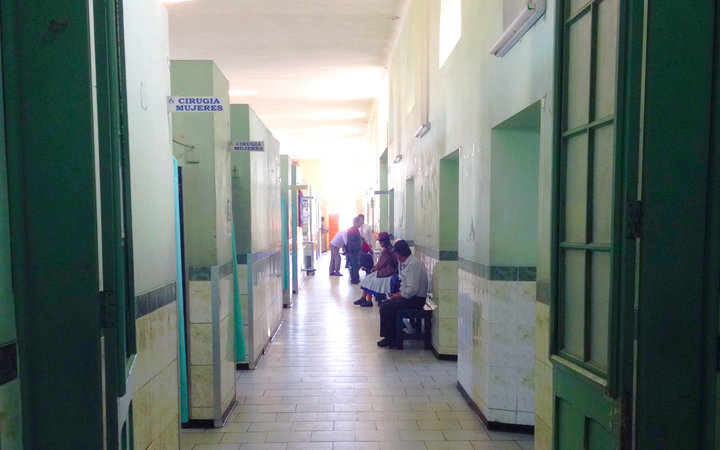
— Hockey is a big part of Sydney's life —
So you made the decision to become a nurse. How old were you at the time?
Kind of. It was around grade 12, which was when I really started looking at schools. I played hockey competitively, so I was in an interesting position in that schools actually started looking at me, rather than the other way around. And so then I went to the school on these ‘recruiting visits’ and looked at each school’s nursing program, while exploring the hockey opportunities.
And you chose to go from Edmonton, Canada all the way to Elmira College in New York!
I did.
What was that transition like?
You mean coming from a very small town in Alberta? It was overwhelming at first, but Elmira is a smaller school and I chose it for a reason. It felt homey and everybody there made me feel welcome.
Both programs were very hard, but it kept me busy. Having said that I was definitely one of the homesick ones on our team.
It was a day of travelling if I wanted to go home!

— Hospitals in the developing world are different from home —
So, what was the initial university experience like from a nursing point of view?
It was good. The first year they kept us excited about nursing, although we weren’t taking very many nursing-specific courses. Elmira is a liberal arts college, so we got all of those courses done, and then we got right into anatomy, physiology and everything like that.
And once year two hit, we started in clinical. It was demanding, but they kept us excited, and the professors cared so much about us. If they saw anyone struggling with anything, they’d pull you in and help you through it. I became very close with my advisor as well, who happened to be the Dean of the program at that time. She never failed to help me plan out courses in a way where I could thrive in both hockey and nursing. Taking some courses online in the summer helped to lighten my load, which was a Godsend during some parts of the season.
Where did your trip away with us fit into all of that? What year were you in?
I was between my third and fourth years. I’d always wanted to do some kind of internship abroad, so I started Googling and found Work the World. I was really focused on oncology when I was in school, and the Work the World program allowed me to get practical experience in an oncology setting.

— A trip like this offers once-in-a-lifetime experiences —
What were some of your standout memories in the hospital when you actually got overseas?
The whole experience was humbling. I knew that a lot of these people had come down from the mountains and that they’d travelled so far just to get this chemotherapy drug that could ‘cure’ them. Unfortunately, a lot of the time it didn’t.
Something that stuck out to me was that they just trusted us and the local staff so much, and to me that was… I don’t know. It was really moving. And even though we couldn’t always understand one another, it was obvious that they were grateful.
Are there any particular patients or cases that stick out in your memory?
I have really positive memories of a grandmother and granddaughter. The granddaughter spoke a little bit of English, but the grandma spoke absolutely none. We laughed a lot and the grandmother thought it was hilarious that I couldn’t understand her. We bonded in some strange way, and even went for walks in between her chemo treatments.

— Experiences like this don't come around everyday —
The granddaughter was a bit more ‘21st century’, but the grandma was in full traditional South American dress. I asked if I could get a picture with her, but she just laughed! She seemed to say “No, no — you don’t want one with me!” But I did end up getting one, and it’s really special to me.
I found out that the grandmother and granddaughter were from a village near a canyon I’d hiked the weekend before. We suddenly discovered something new to talk about. It was the first real connection I made with a patient, and so I think that’s why it sticks out.
From a clinical point of view, what do you think were the most striking differences?
I would say the lack of opportunity for cancer screenings. Treatment-wise things were still surgical, and they still offered chemotherapy. But they didn’t have any radiation that could see.
One doctor I worked with had studied in Texas, and that’s one of the leading places in the US for oncology. She was absolutely brilliant. And she was trying her hardest, but she just didn’t quite have the funding to help the people in the way she wanted to. She did the best with what she had and that was amazing to see. She still managed to help save so many lives.
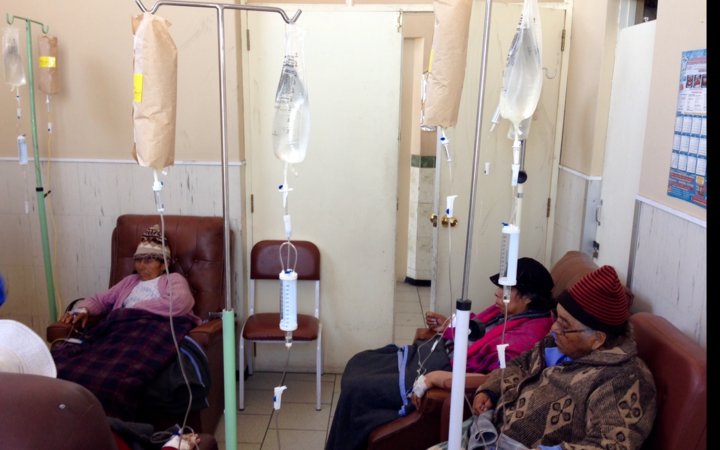
— Patients don't receive the same level of care you're used to —
Okay so going back from the Work the World experience, what did you take from it that has helped you?
Honestly, how grateful we should be. I know a lot of us complain about our healthcare systems but to go to a developing country and get perspective there was something else. It made me realize how fortunate we are — healthcare in Canada is accessible to everybody.
We’re blessed and that’s something we need to be grateful for.
So you came back from your trip and finished school. What did you do after you left university?
I got a job at a hospital in New York State, and the plan was to be oncology certified within a year or two. That would have meant I could have administered chemo and become specialized. After that, the manager said she’d help me move to a pediatric ward. That was something I’d only dreamed of doing up until that point.
Then my manager said, “Before you jump into all this, spend your last summer at home in Canada with your family.” It was so nice of her to be so considerate.
So I went home for summer.
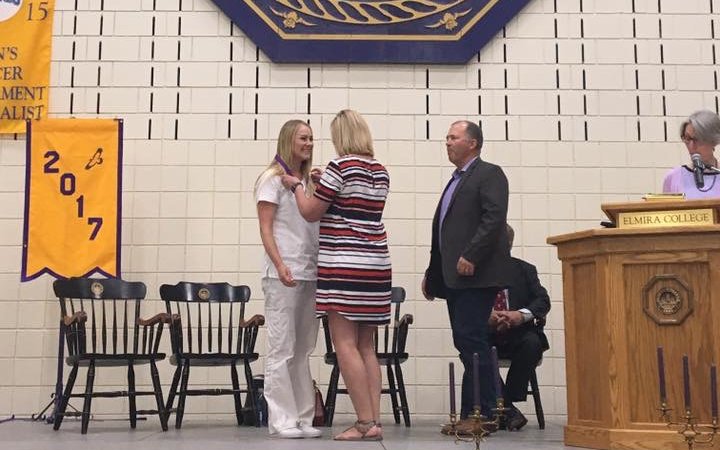
— Sydney took what she learned overseas and applied it to her studies —
Being as homesick as I was, it only took me three days before I called my manager in New York and said… “Sorry, I’m not coming back.”
So where do you find yourself now?
Well I’m working in a rural hospital, so a little bit different from what I learned at school. In the States everything is huge and high tech. The difference between public healthcare and private healthcare is enormous.
When I was at school, everything was online, and we could chart on computers. Then I came back home and went to paper charting. It was a big difference.
Even today, there are some tendencies that would make me ask “why are we doing this?” I’m normally just told “This is how it’s always been…” Coming home took me a little back in time, I guess!
But slowly, Alberta is rolling out a computer charting system. It’s actually the same one I used at school, so I’m excited about that. Spring of 2020 we get it in our rural setting, and I believe it will have a huge impact. We are also locally fundraising for a CT scanner. If a patient needs a CT, we normally have to send them out on a day trip for it. It will be an awesome accomplishment for our hospital.
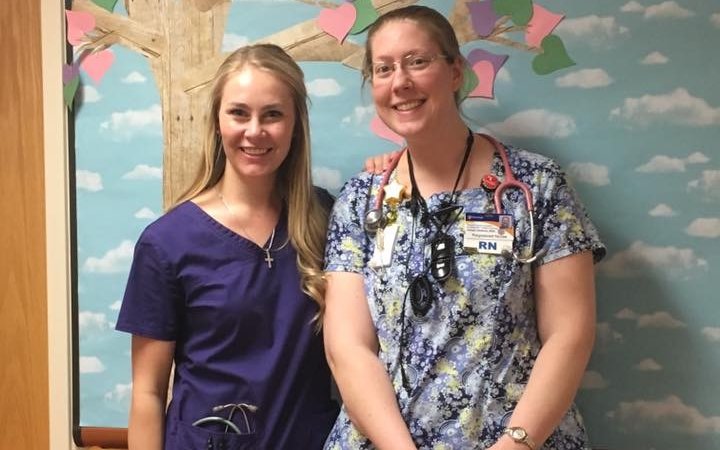
— Sydney is now a qualified RN in a rural hospital at home in Alberta —
What kind of cases are you seeing? What’s normal for a rural hospital in Alberta?
Well right now it’s a lot of long-term care because patients are waiting for a bed and a facility. They are essentially living at the hospital because it’s not safe for them to go home. We provide the best care we can and try to also care for their families who are there a lot too.
We also have a couple of palliative suites, and it is not abnormal for the patients to have cancer diagnosis, so I still interact with cancer patients from time to time. I still love it so much, which is weird I know. It’s so humbling helping people through it.
I’m also on one of our labor and delivery teams, so that’s really fun. Labor and delivery was actually one of my least favorite subjects in school, but I’ve grown to love it.
I suppose when you’re doing it practically, the lived experience is different from studying.
Oh, for sure.
Even when I started out here, I didn’t really want to learn it at all. But I was one of the only RNs so had to. I ended up falling in love with the role!

— Sydney wan't expecting to enjoy some of the things she does now —
I understand you’re also researching postpartum depression as part of your job?
Our labor and delivery team have to go through certain topics each year as set out by our province. These are things we need to learn more about or need to do a better job with.
Being in a small community I’ve delivered a lot of babies, and their moms call me a lot. People know that I’m a labor and delivery nurse, so they call with questions once they get home. A lot of those questions have to do with postpartum.
I even get a lot of husbands who call saying they don’t think their wives are doing well. And as well as answering them, I then go away and think about what we could have done differently in the hospital to help these women.
Unless moms are four or more days postpartum, we can’t technically screen them. But we can look at risk factors, so that’s what we’re focusing on now in the hospital.
One of the nurses from my hospital and I have collaborated with different resources in the community and our public health nurse team. We now provide moms with a lot more resources than they previously had access to. They get a bag with diapers, wipes, baby bottles — stuff like that.

— Professional and personal development are at the heart of the experience —
But they’ve also put together a pamphlet of all the other resources available to moms and dads. This is so that when they’re swept up in the whirlwind of becoming a parent, at least they don’t have to remember everything we’ve taught them.
From a clinical perspective, we can document all the different risk factors and make those available to the public health nurse team. We’ve helped to create a more open line of communication between the community, the hospital and our public health team — this is what we achieved through the research we did.
Finally, do you have any words of encouragement for someone who is thinking about undertaking an overseas placement like this, but is maybe a bit nervous about it, or they’re unsure as to whether it’s the right thing for them?
It is the right thing! It’ll be hard choosing a country and what place you want to go to, but it is the right thing — there’s no doubt in my mind.
You’re going there to make yourself better in your profession and that’s what you need to focus on when deciding.
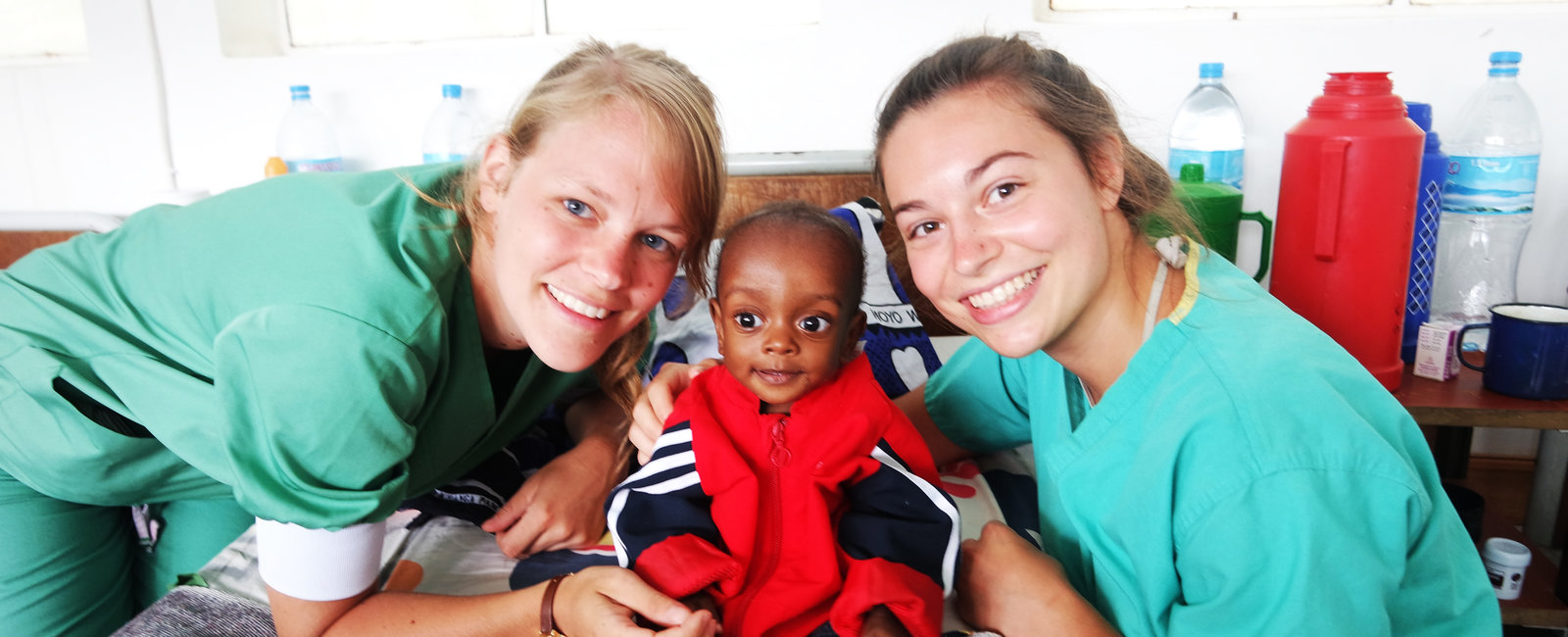
NURSING
INTERNSHIPS
Want to find out how an overseas nursing intership can change your life? You're one button click away.
Want to find out how an overseas nursing intership can change your life? You're one button click away.
